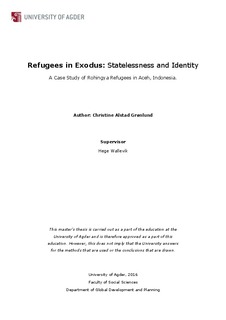| dc.description.abstract | Stateless people are extremely vulnerable, and the risk of exploitation is high. The Rohingya are a severely oppressed minority in Myanmar, within a system that does not protect them but rather abuse the power to mistreat the vulnerable. As soon as international borders are crossed, they reach another level of vulnerability where anyone can exploit them, as they are stateless, paperless, and without protection from any legal system. The Rohingya are considered illegal immigrants and their religion and ethnicity has branded them as threats to the society, security and well-being of Myanmar’s majority. Additionally, refugees and migrants are perceived as threats by large parts of the international society, causing many nations to stay passive in how they perceive their responsibility. What is explored is how forcefully displaced perceive their identity and sense of belonging, and how an alternative culture and identity may be built on the memories of the past from a recovering present. The Rohingya have been denied citizenship in Myanmar, and have been pushed further out of society until reaching the point of forceful displacement and crossing oceans in seek of refuge.
The research draws on qualitative data, mainly collected through in-depth interviews, focus group discussions (FGDs), and participant observation in temporary shelters in Aceh. My findings suggest that the difficult experiences of the past reflect onto how the Rohingya understand their present. The complex political history of Myanmar have influenced the present day attitudes and perceptions of Rohingya as illegal immigrants being a threat to society. Although the country is no longer officially a dictatorship, the military still have power over the most exploitative sectors in Myanmar today. The Rohingya are now temporarily residing in Aceh of Indonesia. Having oppression and discrimination of the past at a distance, the Rohingya can reflect on their past experiences from a temporary place of safety, and create stories and identity as a community set in a different context than their own.. In Aceh, the refugees have received freedoms enabling them to start a life they have alwas wanted. However, as the situation is merely temporary and they still face restrictions, they can only build their lives up to a certain point, before they stagnate by the waiting and insecurity of what awaits. The Rohingya are, and have been, powerless in every situation they have ever faced. Powerless under the exploitative regimes, powerless boat refugees, and powerless refugees waiting for resettlement in a temporary shelter in a foreign country. | nb_NO |
